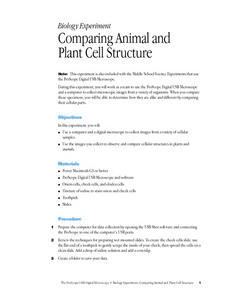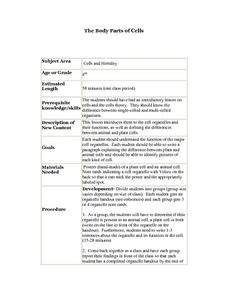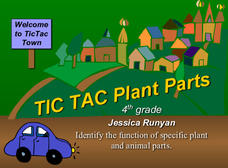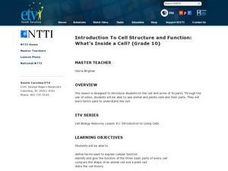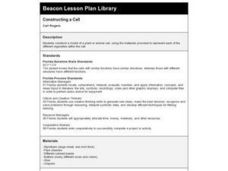Nuffield Foundation
Observing Water Moving Through Plants
We know plants assist in the water cycle, but how do plants get water from the ground into the air? Through a series of demonstrations or labs, scholars observe the movement of water through plants. They microscopically view the cells...
LABScI
Cell Diffusion and Permeability: The See-Thru Egg Lab
Create a model to study a microscopic phenomenon. The seventh of 12 lessons uses an egg (without its shell) to represent a cell membrane. Using different solutions, learners explore the concept of cell diffusion. They monitor...
Curated OER
Comparing Animal and Plant Cell Structure
High schoolers work as a team to use the ProScope Digital USB Microscope and a computer to collect microscopic images from a variety of organisms. When they compare these specimens, they are able to determine how they are alike and...
Cornell University
Plant Cell Crime Scene
Use science to solve the mystery of the Poplar murder. Pupils use forensic botany to determine if a suspect could be the killer. By analyzing images from a Transmission Electron Microscope, learners determine if the material found on the...
Curated OER
AP: Chapter 36: Transport in Plants
When you need a review instructional activity for your AP biologists on water and nutrient transport in plants, this one is for you! From the simple stuctures involved to the complex mechanisms that make it happen, the details of...
Curated OER
The Cell as a System
Students review cell structures and investigate how the components of a cell operate as a system. They compare a plant and animal cell and then make a model of a cell. Students begin to understand the cell as a system by exploring a...
Curated OER
Why Are Plants Green?
Students smash plant parts and wait for visibility of chlorophyl to show why plants turn green. In this green plants lesson plan, students use acetone and filter paper for this experiment.
Curated OER
Cell Structure and Function
In this cell worksheet, students chart the function of various cell structures. Students list the organization of a multicellular organism and illustrate plant and animal cells.
Curated OER
The Body Part of Cells
Eighth graders are introduced to cell organelles and their functions and the they define the differences between animal and plant cells. They write a paragraph explaining the difference between plant and animal cells and students...
Curated OER
Chalkboard Challenge: Science Vocabulary
Review science vocabulary with your students using this Jeopardy-style PowerPoint. Categories for this game include: Solar System, Plants, Weather, Cells, and Rocks. There are a total of 25 clues; five for each category.
Curated OER
Regents High School Exam: Living Environment 2008
Tne New York Regents High School Examinations are comprehensive and include various styles of questions, includingmultiple choice and the analysis of graphs. This particular version, the 2008 Living Environment exam surveys a variety of...
Curated OER
Regents High School Examination: Living Environment 2003
The living environment, from the interior of a cell to the complex relationships among populations, are queried in this final examination. Learners look at air pollution maps, diagrams of cells, population graphs, and drawing of cells....
Curated OER
Bread Cells
Fifth graders examine plant and animal cells. In this plant and animal cell lesson, 5th graders define what cells are, label their parts, and describe how plant and animal cells are different. They observe cells at a number of web sites,...
Curated OER
Tic Tac Plant Parts
This plant biology PowerPoint introduces plant parts and their functions. This PowerPoint allows students to identify each plant part on a diagram, along with its' function. The slides contain a clear explanation of how each plant part...
Curated OER
Cell Study
Learners (females) are introduced to the cell. They discuss what a cell is, and students define what a cell is. Learners comprehend that all living things are made up of cells. They comprehend that life is defined as something that...
Curated OER
Cells, Cells, Cells
Students explore plant and animal cells. Using household items, students create a three-dimensional model of a plant or animal cell. Students identify and label each cell part.
Curated OER
Cell-O
Students create model cells using gelatin, toothpicks, and various fruits to represent organelles. Then, students observe their models and complete a Venn Diagram comparing and contrasting plant and animal cells.
Curated OER
How to: Build a Plant Cell
Students build a 3-dimensional model of a plant cell with household objects. In this plant biology lesson, students construct replica plant cells in groups of three. After completing their projects, students share their creations with...
Biology Junction
Seed Plants: Gymnosperms and Angiosperms
One of the reasons plants found success on land relates to seed development. Scholars learn about many different forms of seeds and how they changed over time. It describes the structure and function of many different types of seeds in...
Curated OER
Introduction To Cell Structure and Function: What's Inside a Cell?
Tenth graders are introduced to the cell and some of its parts. Through the use of video, 10th graders see animal and plants cells and their parts. They learn terms used to explain the cell.
Curated OER
Cells
Learners research both plant and animal cell characteristics. They draw the parts of each cell and as groups present their research.
Curated OER
Parts of the Flower and Pollination
Learners review the parts of the plant and recognize the parts that are important for pollination. In this pollination instructional activity, students illustrate and label the parts of a flower. Learners compare different types of...
Curated OER
Constructing a Cell
Third graders, in groups, make a model of a plant or animal cells and represent each of the organelles in the cell.
Curated OER
Journey to the Center of a Cell
Ninth graders create a large scale model of a eukaryotic cell. In this biology instructional activity, 9th graders identify the different parts and function of the cells by using a robot to navigate through the cell models. They create a...




